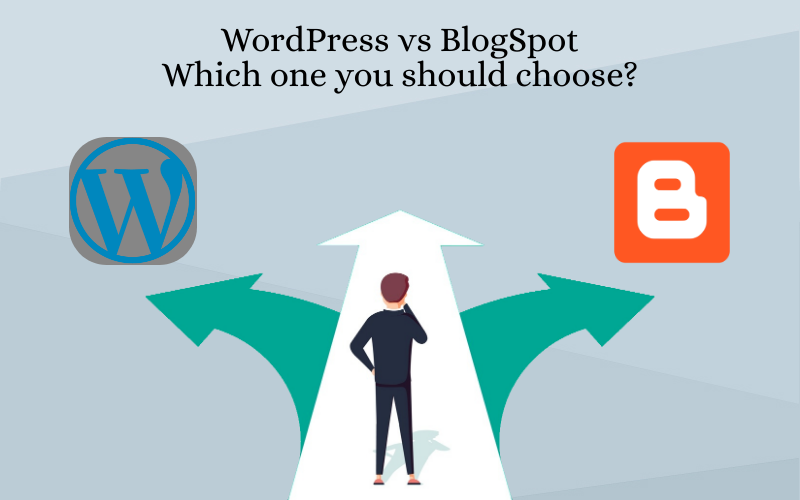Do you want to start a new blog? Not sure which blogging platform you should choose? Well, here is help. When it comes to blogging, there are a plethora of options available for starting a blog, such as WordPress, BlogSpot, Tumblr, and a lot more. One of the most talked-about topics is which blogging platform is better- WordPress or BlogSpot?
This debate becomes confusing at times. Many users prefer BlogSpot because it involves less technical hassles, and a lot of users like WordPress because it is powerful and feature-packed.
What to consider while choosing a blog platform?
Before we start our WordPress vs BlogSpot comparison, let’s cover a few things that are important to look within a blog platform.
# 1. Ease of use- You will require an easy to use platform where you can easily set up your blog, add content, and increase your audience base.
# 2. Flexibility- You will require a platform that is flexible enough to add more and more features as your blog grows.
# 3. Support- You will require assistance while blog creation, designing, and managing it. Check whether the platform provides support or not whenever you need it.
# 4. Monetization options- Do you want to earn money from your blogs? If yes, then you should select a platform that has several monetization options.
Now, let’s get started with their comparison in detail:
Usage convenience: WordPress vs BlogSpot
Setting up a blog in WordPress is an easy thing to do. It involves a one-click installation process to set up WordPress. Once your set up is completed, you can opt for a WordPress blog theme as per your needs. A theme is useful in making your blog attractive. After that, you can begin the installation of WordPress plugins to enhance the features of your WordPress blog. You can even hire a WordPress developer to help you in that process.
BlogSpot is an easy to use blogging platform where you can create a blog in a few minutes. You have to visit a BlogSpot site and then sign up using Google account. After that, you will get a “Create New Blog” option, where you have to click to start the process. You can choose the blog title, address, and a theme. Next, you have to do the configuration of blog settings, edit your blog layout, and add posts. Hence, it has a simple set up process.
Winner: Tie
Flexibility & Control: WordPress vs BlogSpot
Another important factor that you need to consider is flexibility. Does your blog site give you total control over the functionality of your blog? Can you add new features to your blog? Let’s see how WordPress and BlogSpot compare in this context.
WordPress is an open-source platform where you can extend its functionality by adding new features. You can add almost any function to your WordPress blog using plugins and third-party integrations. There are various free and premium WordPress plugins that can help in modifying and extending the default features.
BlogSpot comes with minimal tools that allow you to perform certain tasks on your site. You can do limited things with BlogSpot. It has built-in gadgets that are useful in adding features like ads, subscription links, contact form, and many more.
Winner: WordPress
Appearance & Design Options: WordPress vs BlogSpot
The blog’s design plays an important role in attracting and engaging users on the site. You will require a catchy blog design for engaging users, reducing bounce rate, and increasing the time spent on your blog.
Within WordPress, you will find thousands of free and premium themes that are useful in creating professional sites. There is a WordPress theme available for every kind of site. Regardless of your site’s type, you will get a variety of quality themes which you can modify and customize with ease.
BlogSpot offers a limited set of templates by default. These templates have a basic look as they are used on thousands of blogs. You can change the colors and layouts of these templates with the help of built-in tools. And, you will even get non-official BlogSpot templates that are of low quality.
Winner: WordPress
Security: WordPress vs BlogSpot
Security is another aspect that is necessary to consider while choosing a blogging platform. Unless you select a secure platform, your time and investment will go in vain if your site gets blacklisted or hacked.
WordPress is a highly secure platform. As it is a self-hosted platform, you have to take the responsibility of security and backups. For instance, you can choose UpdraftPlus or VaultPress for backup creation and Sucuri for the web-app firewall to increase security.
With BlogSpot, you will get the added benefit of Google’s secure and robust platform. You don’t have to stress about managing server’s resources, securing blog, or creating backups. But this also implies that the service downtime can make your blog down. You will not be able to do anything if the BlogSpot site gets down.
Winner: Tie
Portability: WordPress vs BlogSpot
With WordPress, it is convenient to move your site anywhere you want. It is possible to move your WordPress site to a new host, modify the domain name, or you can even switch your site to other CMS.
On the other hand, moving a site from BlogSpot to a different platform is a challenging task. There are greater chances that you will lose search engine ranking, subscribers, and followers during the shift.
Winner: WordPress
Conclusion
WordPress and BlogSpot both are popular and widely used blogging platforms. But as you have to choose anyone, it entirely depends on the purpose of your blog.
If your objective is to create a personal blog and share your experiences, then you can opt for a platform like BlogSpot.
But, if you want to build a professional blog, then you will surely need a robust and scalable platform like WordPress and approach a good WordPress development company for the purpose. By using WordPress, you can include a shop to your blog, build a membership site, and add numerous marketing tools within your blog.
Hopefully, this WordPress vs BlogSpot comparison will help you in choosing the right blogging platform.
Author’s bio
Emily White is a talented WordPress developer at CSSChopper. She is having immense knowledge of the WordPress platform and actively follows all the recent developments in this domain. She is passionate about writing blogs on the latest and advanced technologies.








